Today I’m excited to introduce you to Anna Cragin. Anna is passionate about helping handmade business owners rock their online presence. She writes about websites, online stores, social media, and more as they relate to small online businesses. When she offered to write for you about reasons you need to get a website set up for your handmade business, I found myself agreeing with every point so I just had to share. I hope you find it helpful! Thank you so much, Anna.
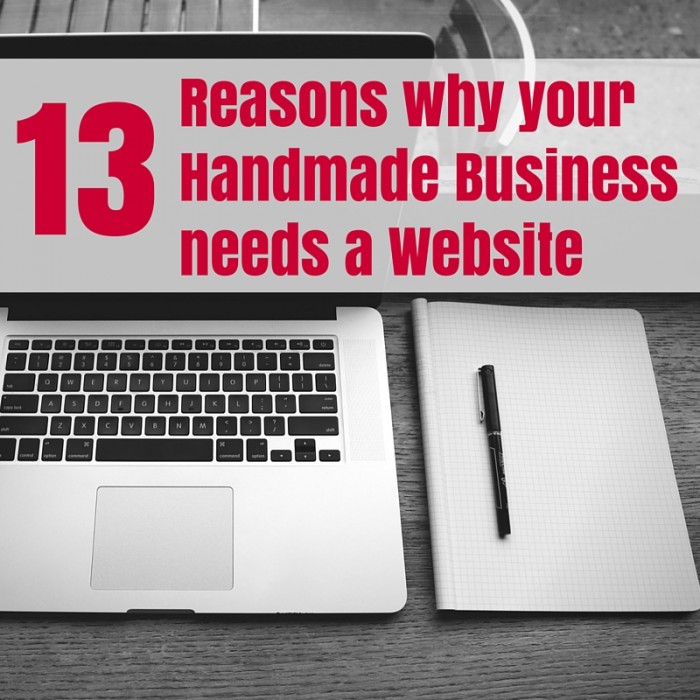
Have a Handmade Business? Here are 13 Reasons Why You Need Your Own Website
A lot of crafty folks who start selling their creations first open an Etsy shop, or set up a virtual home on social media. (I know I sure did when I had my jewellery business!)
There are lots of great reasons why it’s to your advantage to be visible on Etsy and social network platforms: you get increased traffic, the opportunity that new audiences will discover you, and the ease of using a third party application that you don’t have to set up.
However, a lot of the time I see wonderful artisans who never move past selling on Etsy or on Facebook. And I think that’s a big mistake.
In this article, I want to outline 13 reasons why you should have your own website for your handmade business.
#1: Show that you’re serious
A lot of craft businesses are actually “hobby businesses”, where any profits made go toward simply covering your material costs. The marketing and strategy aspects are more relaxed, and you may not even claim to own a business on your taxes.
If that’s you, then it’s totally fine to stick to Etsy and social media. After all, if you are not selling a lot, and you don’t care too much about building your own brand in the online handmade space, it doesn’t make sense to take the time to set up your own website.
If, however, you want your handmade business to pull in a serious income for you and your family, then you need to step it up a bit. Having a well-done website for your business will show your buyers that you take it seriously. (And you will take it seriously, too, and give it the attention it deserves!)
#2: Showcase what your brand is all about
The ease of setting up Etsy or Facebook is balanced by the fact that you can’t customize your presence on these platforms. While you can usually upload a logo, profile photo, or a cover photo, that’s usually where the customization ends.
Why is this important? Because if you are trying to build a brand, you need all the elements that make a strong brand: your story, your audience, your voice, and your visual and emotional vibe.
Having your own website will allow you to control all of those aspects, while on Etsy and Facebook you look ‘cookie cutter’, just like everyone else.
#3: Convey your personality
The number one advantage that you, the independent artisan, have over the likes of Anthropologie and so on is that you are a real person. Not just some faceless corporation (hmmm… possibly like Etsy or Facebook??)
Having your own website will allow you to own the things that make you and your work uniquely YOU – from the colors you pick to the fonts to how you choose to lead your visitors around your virtual home and studio.

#4: Customized navigation
If you’ve used Etsy or social media networks, you have probably have seen that all of them have limitations on how you can present your business on that particular platform.
For instance, have you noticed that Instagram only gives you one active link in your profile? That one thing has everyone bending over backwards changing that link to what is most relevant from one day to the next.
With your own website, you can pick and choose what to showcase as well as how, when, and where. You completely control how your visitors interact with your website (and your brand and business).
#5: You can create specific Calls to Action
A “Call to Action”, or “CTA”, is just a fancy way of saying “Ask your visitors to do something”.
Even though you can use CTAs on any platform (because you can always just say, “Hey, click on this link” or “Leave me a comment here”), on your own website you really have free reign to do this in a way that makes the most sense for how you like to connect with your audience.
For instance, maybe you want to host a contest, or have your audience leave a testimonial about what it’s like to work with you. When you build that intent into your website, it becomes a much better experience for your visitors, without them having to jump through hoops to get around another platform’s limitations.
#6: You can collect email addresses
An email list is no doubt the MOST IMPORTANT thing for your business. Why that is can really be a whole other blog post in itself (and in fact I’ve written several on my own site about this topic), but suffice to say that your list of emails is pretty much your list of customers. If you don’t have such a list, you in effect don’t have any customers.
Given how important this is, you may be shocked to discover that you can’t easily collect emails on third party platforms. Each platform has very specific and strict rules about this sort of thing, and with good cause, given that anti-spam legislation is a big deal.
However, when you run your own website, you can easily put policies in place that allow you to (legally) collect email addresses and contact customers directly.
#7: Engage with visitors in the way you want
When you run your own show, so to speak, you can pick and choose how you want to interact with your website visitors. You can choose to connect with them through blog post comments, reviews and testimonials, videos, and even live chat.
This is important because the way you build your business relationships is unique to you and your business, and should not be dictated by another platform’s rules. You want to be as authentic in your business as possible and build real relationships.
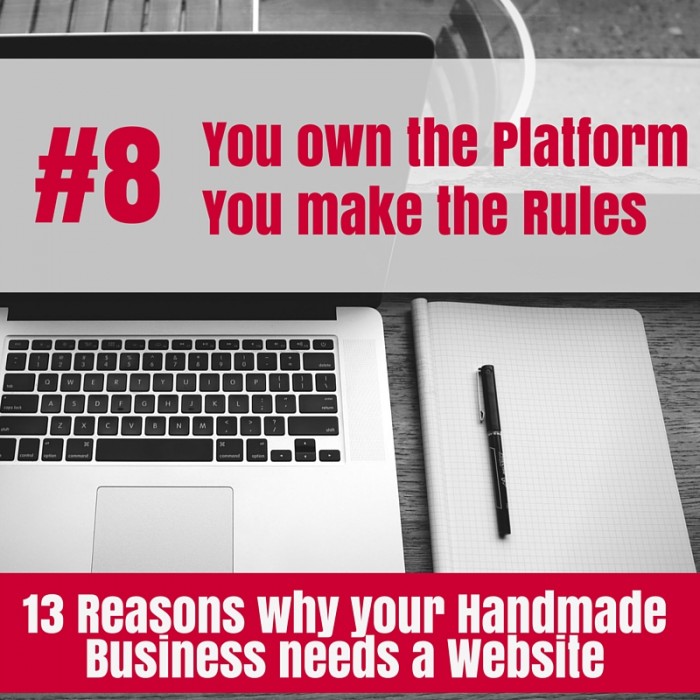
#8: You own the platform, you make the rules
This is really what it all comes down to: when you own your own website, you can never be in violation of some arbitrary rules.
Also, you have the power to dictate the code of conduct of your visitors. Don’t want to put up with ‘negative Nancys’? Then you don’t have to. (Apologies to any Nancys reading this! Nothing personal, just an expression.)
#9: Nobody can shut down your business
Have you heard those horror stories of people getting banned from Etsy or having their Facebook page completely shut down? Those folks have lost all their content, item listings, and customer base. In essence, their business has been effectively shut down.
When you own your own website, nobody can ever shut you down. You own your own content, your list of customer emails, and you can never be in violation of ever-changing Terms of Service. (You are, of course, still bound by the laws of where you live, but that’s pretty much it.)
#10: Have a “home base” to send your people to
Your website is kind of like the beating heart of your business. All the roads lead back to your site. Whenever you talk about your business to others, you can give them your own custom, hopefully easy to recall, URL instead of saying something like “just search Etsy for my shop name”.
(Firstly, that sounds highly unprofessional — see reason #1 above — and secondly, people are way too lazy to search on Etsy for a shop name they may or may not remember).
#11: Keep more of your profits
This scenario concerns the issue of repeat customers. Once you get a customer on a platform like Etsy or Facebook, your wisest course is to get that person on your email list (legally, of course, and always with their consent).
When they are ready to buy again, they will buy from you, and this time, you get to keep more of your own profit because you didn’t have to pay a “finders fee” to Etsy.
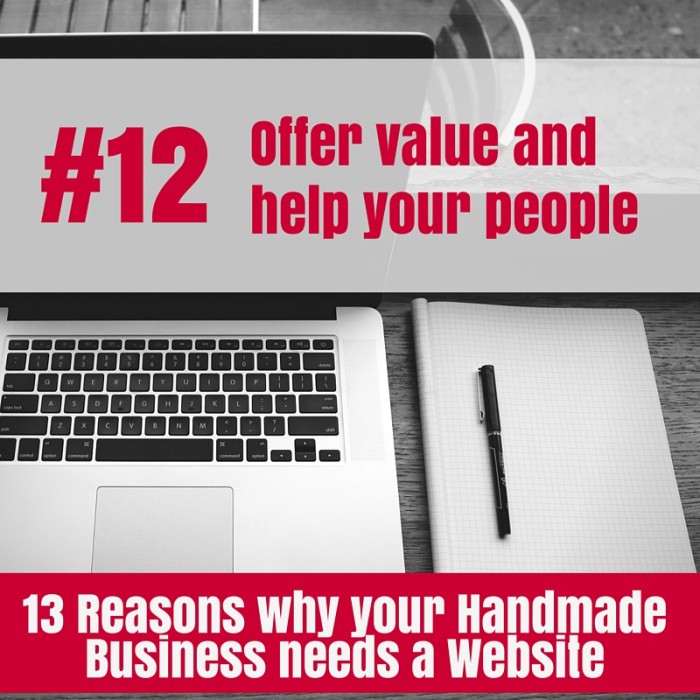
#12: Offer value and help people the way you want to
This is not a limitation of social media (because creating content is the lifeblood of social networks), but it is an issue with a third party selling platform like Etsy. The issue is that there is just no good way to create valuable, helpful content for your audience on a website like Etsy.
Third party selling platforms exist for one purpose and one purpose only: to sell stuff.
But unfortunately, making the sale is a much more complicated process than someone just seeing a listing online and immediately buying it. It does happen, but the majority of sales are made after consistent nurturing and trust building.
The best way to get people to trust you is by offering helpful solutions to issues that they may have. Those issues may be as simple as not knowing how to accessorize an outfit, or they may be more complex, such as receiving support for a disease or disability.
When you position yourself as a trusted and valuable resource, those people will keep coming back to your site and will keep buying from you on a repeat basis. That kind of relationship just can’t be fostered on a selling platform alone.
#13: It’s not terribly difficult, and costs less than you think
OK, so this is not really a reason like all the others, but given the advantages for your business to have a standalone website, I want to reassure you that building one is not beyond your skill set or your budget.
It may have been the case in the 90’s that you had to know coding or had to buy expensive software to build websites, but that simply is not the case anymore. We now have wonderful software that is freely available to help us build modern websites without a single line of code. WordPress is such software and the one that I use myself and recommend wholeheartedly.
Running the average website is not as expensive as you may think either. In fact, running a single website usually costs less than $100 per year. That’s about the cost of doing an outdoor art market two times. Only your website will be making sales for you 24/7/365.
All this being said, I’m not discouraging you from operating an Etsy shop or being on social media. All these activities are complimentary, and, when used strategically, will help you grow your business.
As you can tell, though, I’m a big fan of every handmade business owner running their own website. These days having a website for your business is no longer optional. But I understand that if you’ve never thought about building your own website it can seem daunting.
That’s why I created a step-by-step Website Setup Game Plan, that will help you think about how you want to use your website and how to get started actually building it. You can download it for FREE by following the link in my author bio under this post.
Now I want to hear from you: what is your biggest challenge when you’re thinking about building your own website? Let me know in the comments below. I’ll be checking in for the next few days to answer them.

About the Author
Anna Cragin is passionate about helping handmade business owners rock their online presence. She writes about websites, online stores, social media, email outreach, and how to juggle all the tasks that are required to run a small business. She’s on a mission to inspire and educate crafty folks to run amazing businesses, and to that end, she has created this Strategic Website Game Plan that you can download for FREE right here.
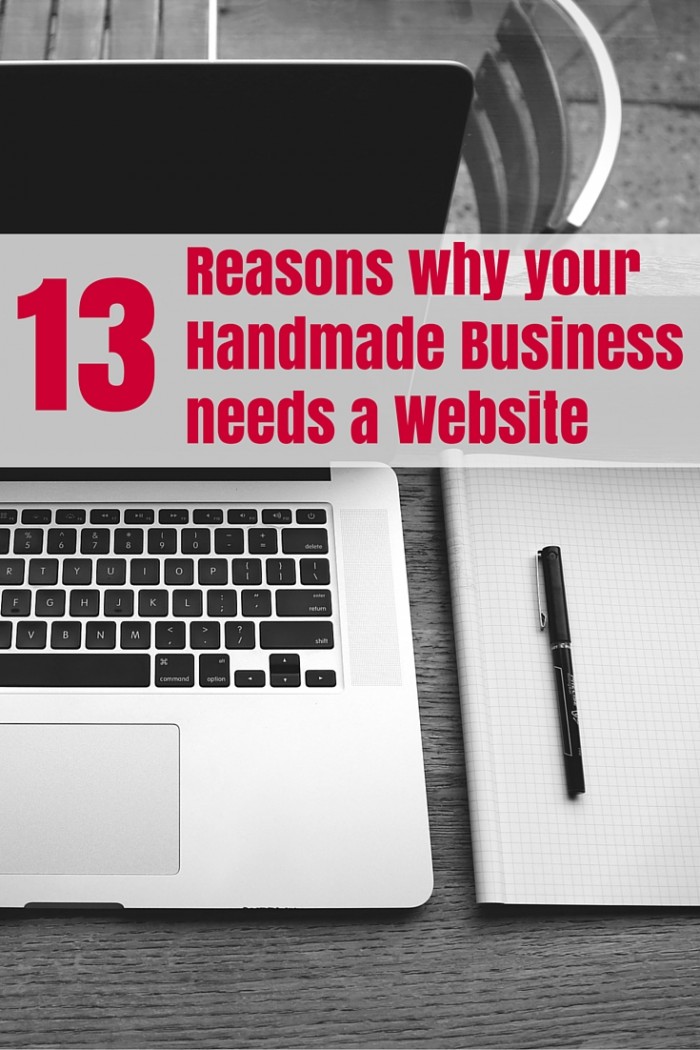
More posts about handmade business:
- Add a Shopping Cart to your Blog or Facebook Page
- Madeit Tips and Tutorials and Madeit Store Tips
- Know your Madeit Store
- Pinterest Tips for Madeit Sellers


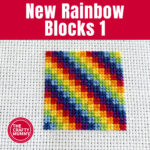
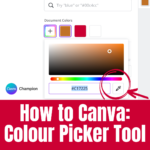



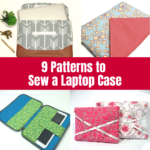

I don’t really know how to start about getting a business off the ground .I make handmade kitchen towels and rag rugs an items for the kitchen an home
Hi Delois!! The first step is to get to know who is your ideal customer? Are they home makers? Are they younger or older? Do they have kids? Where do they live? What are their interests? Get really specific. All these questions will help you figure out what to make for them and what content you can create to help them discover and connect with you online.
A lot of people will say to just start an Etsy store or a website, but honestly it’s probably better that you engage in some Facebook groups first to find your people (for instance, there are a lot of groups for moms, as well as groups based around various interests, like cooking or even specific types of cooking). Once you have a good idea of what they like to consume online, you can then create your website with those interests in mind. Focus on building an email list from the beginning, even if you don’t have much to sell.
Meanwhile, think about how you can create a line of products for the kitchen, like you said, that would be reproducible and of course fit with your ideal customer.
The number 1 mistake I see online handmade sellers make all the time is trying to sell to everybody. That’s a sure way to fail. So, focus on finding your people first, get their email addresses, and then create your products with them in mind.
Hope that helps!! Let me know if you want to chat more about this 🙂